北师大版(2019)必修第三册Unit 9 Learning Lesson 3 The Secrets of Your Memory 课件(共40张PPT)
文档属性
| 名称 | 北师大版(2019)必修第三册Unit 9 Learning Lesson 3 The Secrets of Your Memory 课件(共40张PPT) |
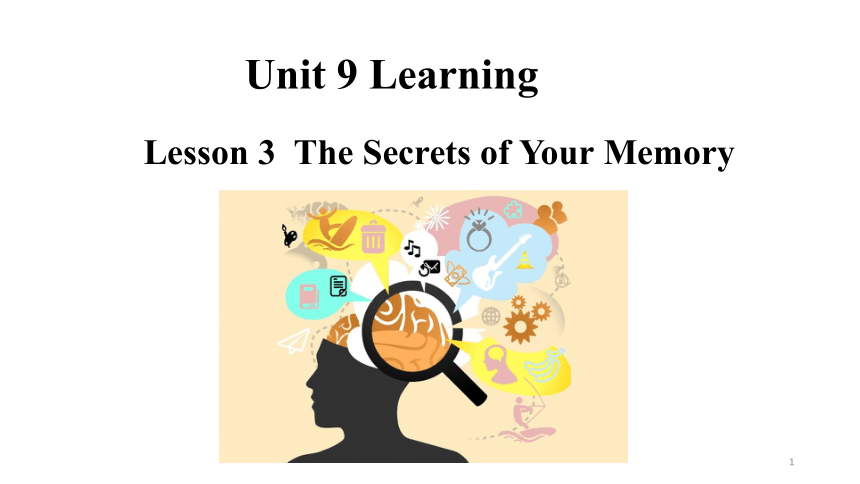
|
|
| 格式 | pptx | ||
| 文件大小 | 3.7MB | ||
| 资源类型 | 教案 | ||
| 版本资源 | 北师大版(2019) | ||
| 科目 | 英语 | ||
| 更新时间 | 2024-04-02 00:00:00 | ||
图片预览

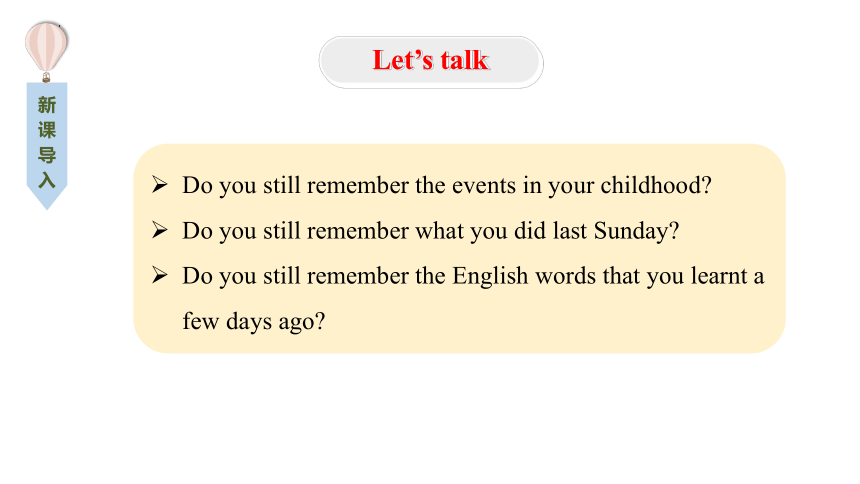
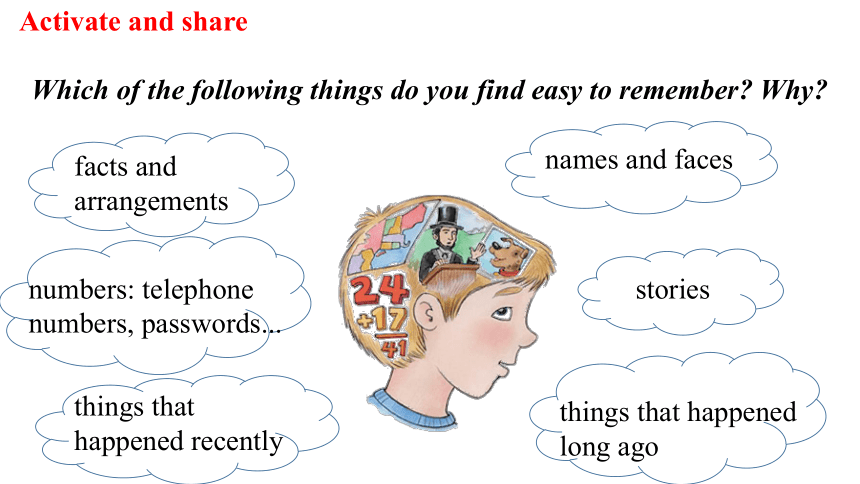
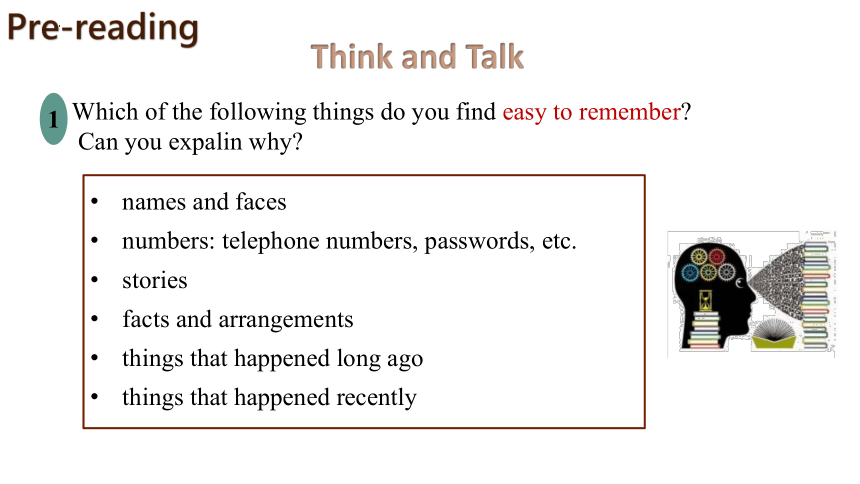
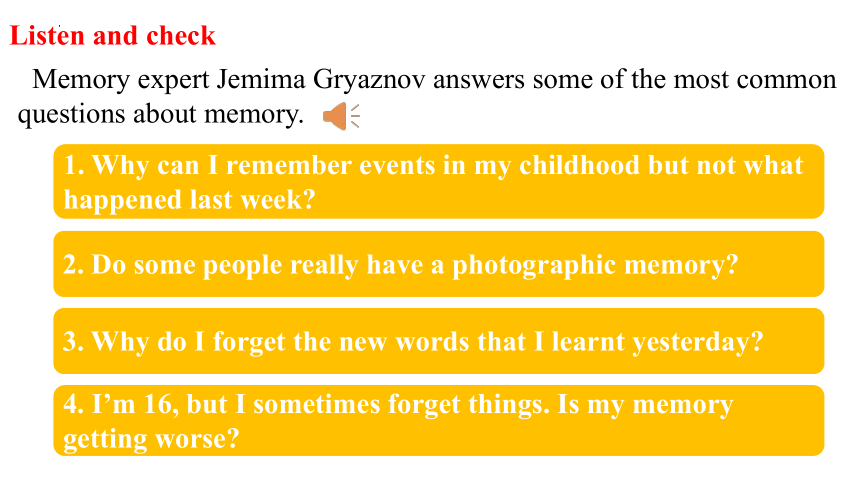
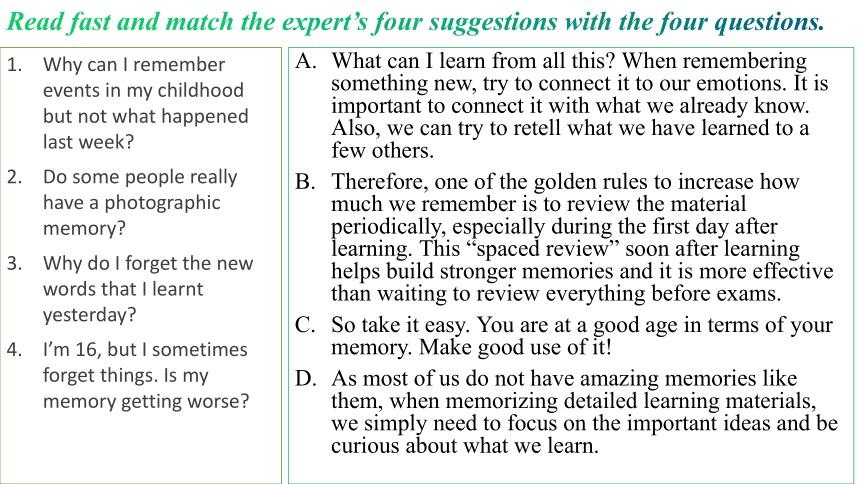
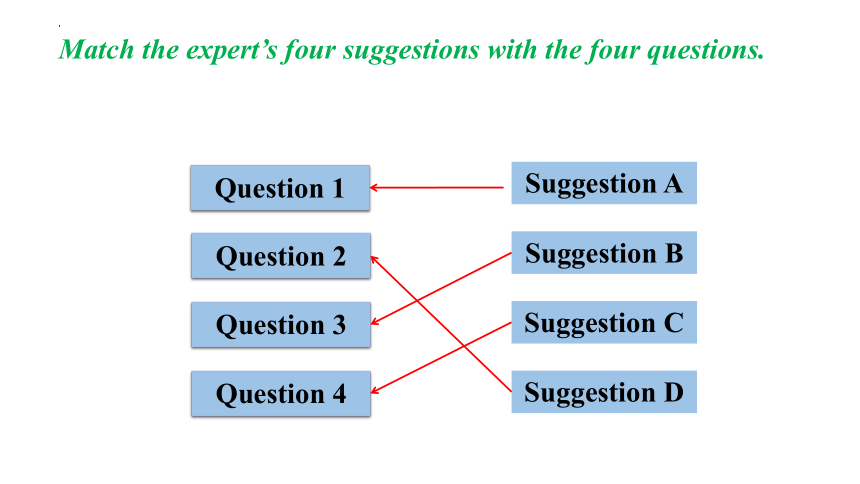
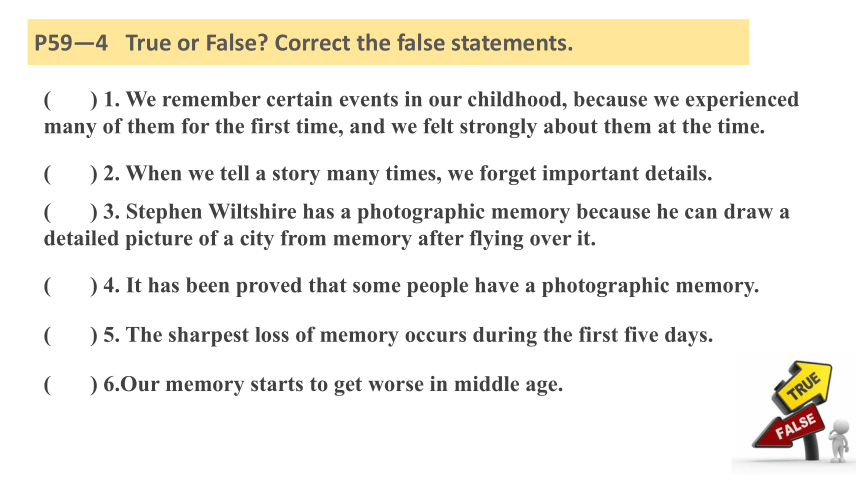
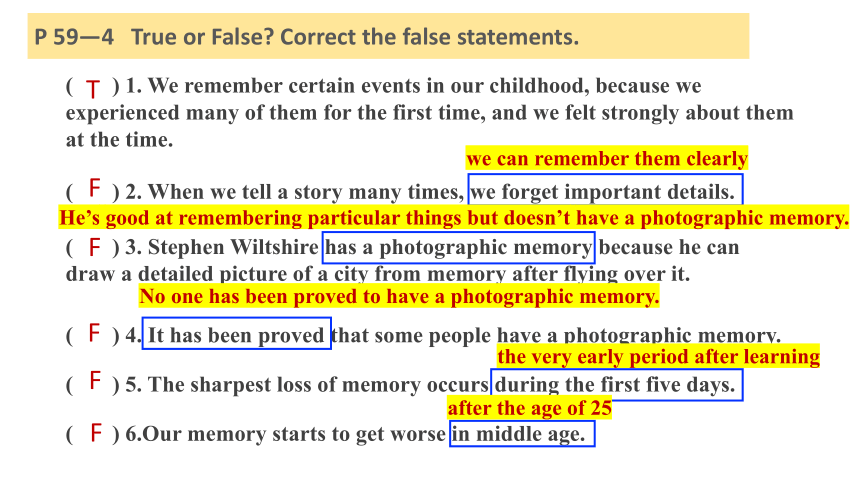
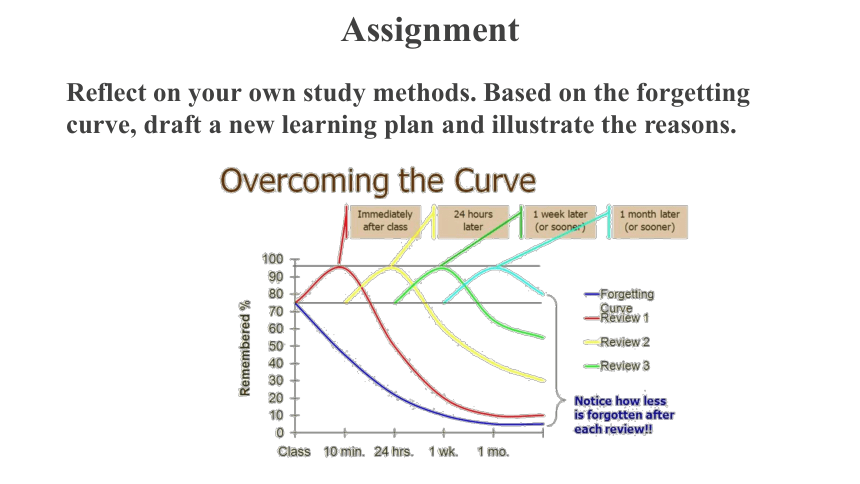
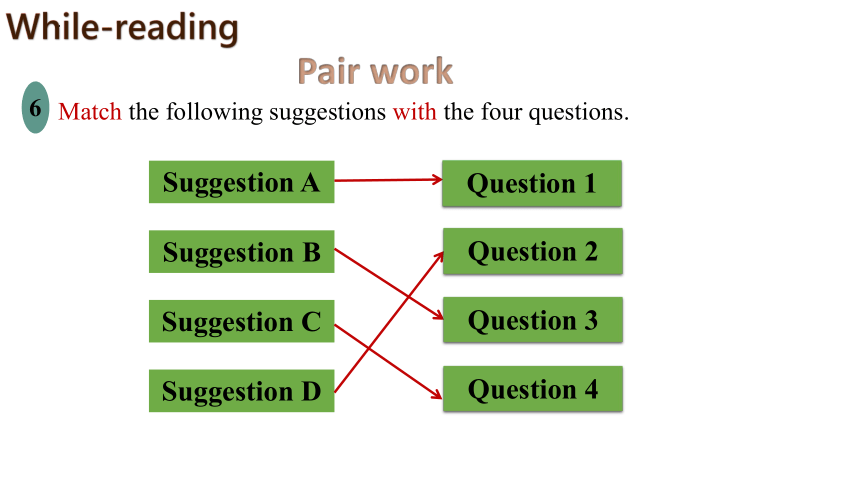
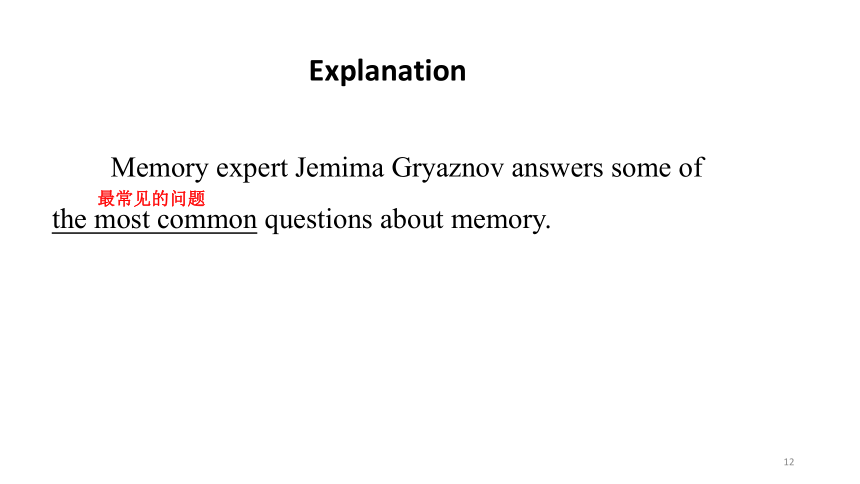
文档简介
(共40张PPT)
Lesson 3 The Secrets of Your Memory
1
Unit 9 Learning
新 课 导 入
Let’s talk
Do you still remember the events in your childhood
Do you still remember what you did last Sunday
Do you still remember the English words that you learnt a few days ago
Activate and share
Which of the following things do you find easy to remember Why
names and faces
facts and arrangements
stories
things that happened long ago
things that happened recently
numbers: telephone numbers, passwords...
Think and Talk
Pre-reading
Which of the following things do you find easy to remember
Can you expalin why
names and faces
numbers: telephone numbers, passwords, etc.
stories
facts and arrangements
things that happened long ago
things that happened recently
1
Listen and check
Memory expert Jemima Gryaznov answers some of the most common questions about memory.
1. Why can I remember events in my childhood but not what happened last week
2. Do some people really have a photographic memory
3. Why do I forget the new words that I learnt yesterday
4. I’m 16, but I sometimes forget things. Is my memory getting worse
Why can I remember events in my childhood but not what happened last week
Do some people really have a photographic memory
Why do I forget the new words that I learnt yesterday
I’m 16, but I sometimes forget things. Is my memory getting worse
What can I learn from all this When remembering something new, try to connect it to our emotions. It is important to connect it with what we already know. Also, we can try to retell what we have learned to a few others.
Therefore, one of the golden rules to increase how much we remember is to review the material periodically, especially during the first day after learning. This “spaced review” soon after learning helps build stronger memories and it is more effective than waiting to review everything before exams.
So take it easy. You are at a good age in terms of your memory. Make good use of it!
As most of us do not have amazing memories like them, when memorizing detailed learning materials, we simply need to focus on the important ideas and be curious about what we learn.
Read fast and match the expert’s four suggestions with the four questions.
Question 1
Question 2
Question 3
Question 4
Suggestion A
Suggestion B
Suggestion C
Suggestion D
Match the expert’s four suggestions with the four questions.
( ) 1. We remember certain events in our childhood, because we experienced many of them for the first time, and we felt strongly about them at the time.
( ) 2. When we tell a story many times, we forget important details.
( ) 3. Stephen Wiltshire has a photographic memory because he can draw a detailed picture of a city from memory after flying over it.
( ) 4. It has been proved that some people have a photographic memory.
( ) 5. The sharpest loss of memory occurs during the first five days.
( ) 6.Our memory starts to get worse in middle age.
P59—4 True or False Correct the false statements.
( ) 1. We remember certain events in our childhood, because we experienced many of them for the first time, and we felt strongly about them at the time.
( ) 2. When we tell a story many times, we forget important details.
( ) 3. Stephen Wiltshire has a photographic memory because he can draw a detailed picture of a city from memory after flying over it.
( ) 4. It has been proved that some people have a photographic memory.
( ) 5. The sharpest loss of memory occurs during the first five days.
( ) 6.Our memory starts to get worse in middle age.
T
F
F
F
F
F
we can remember them clearly
He’s good at remembering particular things but doesn’t have a photographic memory.
No one has been proved to have a photographic memory.
the very early period after learning
after the age of 25
P 59—4 True or False Correct the false statements.
Reflect on your own study methods. Based on the forgetting curve, draft a new learning plan and illustrate the reasons.
Assignment
Pair work
While-reading
Match the following suggestions with the four questions.
6
Suggestion A
Suggestion B
Suggestion C
Suggestion D
Question 1
Question 2
Question 3
Question 4
12
Explanation
Memory expert Jemima Gryaznov answers some of the most common questions about memory.
最常见的问题
1. Why can I remember events in my childhood but not what happened last week
We remember things that have strong connections in our mind, especially emotional connections. Childhood memories are often very emotional. This is because when we experience things for the first time, we often have strong feelings of fear or excitement. Also, interesting or funny stories from our childhood are often told again and again. As a result, we remember them much better, as retelling events helps fix experiences in our memories.
What can we learn from all this When remembering something new, try to connect it to our emotions. It is important to connect it with what we already know. Also, we can try to retell what we have learnt to a few others.
童年时期
因为
这是因为
首次
反反复复
所以
Connect with 与…联系起来
做…很重要
7
What truths about memory does Jemima Gryaznov discuss in the text What advice does she give to improve one's memory
1
Truth: We remember things that have strong connections in our mind, especially emotional connections.
Advice: We need to make strong connections with things we want to remember in our mind, especially emotional connections.
15
2. Do some people really have a photographic memory
A person with a photographic memory could remember every detail of a picture, a book or an event many years later, but no one has proved that there are people who really have photographic memories. Yet, there are some people who do have amazing memories. For example, Daniel Tammet can remember the first 22,514 digits of pi (π) and Stephen Wiltshire can draw a detailed picture of a city from memory after flying over it in a helicopter. They are both good at remembering particular things for a limited time.
As most of us do not have amazing memories like them, when memorising detailed learning materials, we simply need to focus on the important ideas and be curious about what we learn. Asking questions about what we learn also helps with memorisation. Another effective technique to remember things is to group similar ideas or information together so that they can be easily connected to things that are already known.
擅长
专注
例如
对…好奇
像…perp
有限的时间内
主语从句
分组分类v
为的是
3. Why do I forget the new words that I learnt yesterday
Don’t worry. This is natural for many people. In1885, Hermann Ebbinghaus published a book called Memory and presented a famous forgetting curve. According to him, the sharpest loss of memory occurs during the very early period after learning. This means timely review during this period, with a few revisits to what is learnt, can significantly help us to remember the information.
Therefore, one of the golden rules to increase how much we remember is to review the material periodically, especially during the first day after learning. This “spaced review” soon after learning helps build stronger memories and it is more effective than waiting to review everything before exams.
遗忘曲线
根据…
及时复习
2
Truth: Nobody has a photographic memory.
Advice: We need to focus on the important ideas and be curious about what we learn when memorizing complex learning materials.
3
Truth: The sharpest loss of memory occurs during the very early period after learning.
Advice: We need to review the information at regular intervals, especially in the first day after learning it.
4. I’m 16, but I sometimes forget things. Is my memory getting worse
Definitely not. Our memory reaches its full power at the age of 25. At that point, we can remember up to 200 pieces of information in a second. After this age, however, the brain starts to get smaller. By the age of 40, we lose 10,000 brain cells every day. By middle age, our memory is significantly worse than when we were young.
So take it easy. You are at a good age in terms of your memory. Make good use of it!
别紧张
就…而言
充分利用
到…岁时
在…岁时
总计达
一秒钟内
比…更差
4
Truth: Our memory reaches its full power at the age of 25.
Advice: We need to train our memory to remember more when we’re older.
Question 1
Advice
We need to make strong connections with things we want to remember in our mind, especially emotional connections.
What truths about memory does Jemima Gryaznov discuss in the text What advice does she give to improve one's memory
7
Careful Reading
While-reading
Truth
We remember things that have strong connections in our mind, especially emotional connections.
Careful Reading
While-reading
Question 2
Advice
Nobody has a photographic memory.
Truth
We need to focus on the important ideas and be curious about what we learn when memorising complex learning materials.
Careful Reading
While-reading
Question 3
Advice
The sharpest loss of memory occurs during the very early period after learning.
Truth
We need to review the information timely, especially in the first day after learning it.
Careful Reading
While-reading
Question 4
Our memory reaches its full power at the age of 25.
Truth
We need to train our memory to remember more before getting older.
Advice
Recalling
What suggestions does the memory expert put forward to help memorise things
Reflect on your own study methods. Based on the forgetting curve, draft a new learning plan and illustrate the reasons.
9
Replace the underlined words and phrase with the words from the text.
1. Jemima Gryaznov thinks people remember things that have strong sentimental attachment.
2. When we do things with enthusiasm, we tend to remember them well.
emotional
excitement
3. When we try to remember detailed material, we should focus on the important ideas.
4. Jemima Gryaznov suggested another effective method to remember things: grouping similar ideas or information together.
5. A good strategy to increase memory is to review the material you are trying to remember often.
memorise
technique
periodically
Group Work. Read the tips for improving your memory. Which tips seem most / least useful Which, if any, would be useful for English learning
Five Tips for Improving Your Memory
1 Sleep well: If you don't sleep properly, you “lose” many of your memories.
2 Do physical exercise: When you exercise, more oxygen goes to your brain and makes your memory work better.
3 Do mental exercise: It is important to exercise your brain just like your body. New activities are more challenging than familiar ones.
4 Be interested: Ask yourself questions about what you are learning. We learn better if we are interested.
5 Form a mental picture: For example, if you want to remember the name “John Keys”, imagine his face with a big key on it. The stranger the picture, the better!
Jemima Gryaznov thinks people remember things they have strong sentimental attachment.
When we do things with enthusiasm, we tend to remember them well.
When we try to remember detailed materials, we should focus on the important ideas.
Jemima Gryaznov suggested another effective method to remember things: grouping similar ideas or information together.
A good strategy to increase memory is to review the material you are trying to remember often.
emotional
excitement
memorise
technique
periodically
Practice
P60-9 Replace the underlined words and phrase with the words from the text.
tend vi. & vt. 往往会;趋向,趋于
[归纳拓展]
tend to do sth. 常常会做某事,往往会做某事
tend to/towards... 趋向……,趋于……
tendency n.趋向;倾向
have a tendency to do sth. 有做某事的倾向
as a result “因此,结果”
常位于句首,且常用逗号与句子的其他成分隔开
[归纳拓展]
as a result of 作为……的结果,因为(后接原因)
result from 因……发生,随……产生(后接原因)
result in= cause/ lead to/ bring about 造成,导致(后接结果)
Focus on language: Subject-Verb Agreement
主谓一致
Subject-verb agreement
定义:主谓一致是指谓语动词在人称和数上和主语一致,一般遵循三个原则,即语法一致原则,意义一致原则和就近一致原则。
一. 语法一致原则
主语的单复数决定了谓语动词的单复数。
1. 动名词,动词不定式,从句或不定代词作主语时,谓语动词常用单数。
例句:
Listening to music makes me relaxed after a busy day.
听音乐使我在一天的忙碌之后放松。
Everything is in a complete mess, which drives people crazy.
所有的事情都毫无头绪,让人发疯。
What he said is far from the truth.
他的话与事实相差太远了。
2. 主语后跟有with, together with, as well as, like, but, rather than, including等时,谓语动词的数要与前面的主语保持一致。
例句:
The teacher as well as his students was very excited.
老师和他的学生们都很兴奋。
I think Tom, rather than you is to blame for the accident.
我认为是汤姆而不是你该为这起事故受到责备。
概念
主谓一致是指句子的主语和谓语:
语法一致,即单复数形式要一致。
例如:She lives in China.
Many experts say that you should review information periodically after you learn it.
意义一致,即主语意义上的单复数要与谓语的单复数形式一致。
例如:The news was surprising.
就近原则,即谓语动词的单复数形式取决于最靠近它的词语,一般来说,主语为不可数名词和可数名词的单数形式时,动词用单数,主语为可数名词复数时,动词用复数。
例如:There is much water in the thermos.
Grammar Summary
谓语动词用单数
1. 当句子的主语是动词-ing形式或不定式,以及each,either,neither,everyone,anyone,nobody,no one等词时谓语动词采用单数形式。
例如:Each of the children gets a book to read.
Writing your notes clearly helps you remember the things better.
2. 表示时间,距离,金钱等的复数名词作主语表达一个整体概念时,谓语动词常用单数。
例如:One million dollars is a lot of money.
3. 当句子是“more than one +名词”和“many a +名词”作主语时,谓语动词常用单数。
例如:More than one teacher gets the flowers.
Many a student has been sent to plant trees.
4. 如果and连接的两个词是指同一个人、同一事物或同一概念,则两个名词共用一个冠词,谓语动词用单数。
例如:The teacher and writer is her friend.
Grammar Summary
谓语动词用复数
1. 由and或both ... and ...接两个单数名词作主语时,指的是复数概念,谓语动词用复数。
例如:Fire and water do not agree.
2. 有些集合名词如:cattle,folk,people,police,poultry(家禽)等作主语,谓语一般用复数。
例如:The police have caught the criminal.
3. 表示成双成套的名词,如:trousers,shoes,glasses等作主语时,谓语动词用复数。
例如:His black trousers are too long.
4. 名词clothes,works(著作),goods,contents,the Olympic Games作主语时,谓语动词用复数。
例如:His works have been translated into several foreign languages.
Grammar Summary
就近原则
当句子是there be句型,或主语由以下短语构成,谓语的单复数要遵循就近原则:neither ... nor ...,either ... or ...,or,whether … or …,not only ... but also ...,not … but …等。
例如:Either the teachers or the principal is to blame for the accident.
There is a book and some pens on the floor.
There are some pens and a book on the floor.
Grammar Summary
特殊用法
1. 名词后面带有with,along with,together with,besides,except,but,like,including,as well as,rather than共同做主语时,谓语动词与这些短语前面的那个名词的数一致。例如:A library with five thousand books is offered to that nation as a gift.
An expert, together with some assistants, was sent to help in this work.
2. population表示“一个国家或地区的人口数”作主语时,谓语动用单数形式。当它前面有分数或百分数时,谓语动词用复数形式。
例如:The population of Canada is about 29 million.
About eighty percent of the population of this country are peasants.
3. 集合名词作主语,如果表示整体概念,谓语动词用单数形式;如表示成员则用复数。常见的有:army,audience,class,club,committee,company,crowd,family,group,government,organization,party,team等。
例如:Our football team is playing well.
Our football team are having baths and are then coming back here for supper.
Grammar Summary
Circle the subjects of the sentences in the Sentence Builder. Then use the correct form of the verbs to complete the sentences.
10
Retelling events _______ (help) fix experiences in our memories.
There ______ (be) some people who do have amazing memories.
They _______ (be) both good at remembering particular things for a limited time.
One of the golden rules to increase how much we remember ____(be) to review the material periodically.
Sentence Builder
helps
are
are
is
Circle the correct answer.
11
1. If anybody has / have any tips for memorising information, I would like to
hear them.
2. Many experts says / say that you should review information periodically
after you learn it.
3. Each of the students is / are trying one of these memorising techniques
this week.
4. Both of my English teachers tells /tell me to ask questions to identify the
most important information I need to remember.
5. Writing information down clearly makes / make it easier for you to review
it later.
Lesson 3 The Secrets of Your Memory
1
Unit 9 Learning
新 课 导 入
Let’s talk
Do you still remember the events in your childhood
Do you still remember what you did last Sunday
Do you still remember the English words that you learnt a few days ago
Activate and share
Which of the following things do you find easy to remember Why
names and faces
facts and arrangements
stories
things that happened long ago
things that happened recently
numbers: telephone numbers, passwords...
Think and Talk
Pre-reading
Which of the following things do you find easy to remember
Can you expalin why
names and faces
numbers: telephone numbers, passwords, etc.
stories
facts and arrangements
things that happened long ago
things that happened recently
1
Listen and check
Memory expert Jemima Gryaznov answers some of the most common questions about memory.
1. Why can I remember events in my childhood but not what happened last week
2. Do some people really have a photographic memory
3. Why do I forget the new words that I learnt yesterday
4. I’m 16, but I sometimes forget things. Is my memory getting worse
Why can I remember events in my childhood but not what happened last week
Do some people really have a photographic memory
Why do I forget the new words that I learnt yesterday
I’m 16, but I sometimes forget things. Is my memory getting worse
What can I learn from all this When remembering something new, try to connect it to our emotions. It is important to connect it with what we already know. Also, we can try to retell what we have learned to a few others.
Therefore, one of the golden rules to increase how much we remember is to review the material periodically, especially during the first day after learning. This “spaced review” soon after learning helps build stronger memories and it is more effective than waiting to review everything before exams.
So take it easy. You are at a good age in terms of your memory. Make good use of it!
As most of us do not have amazing memories like them, when memorizing detailed learning materials, we simply need to focus on the important ideas and be curious about what we learn.
Read fast and match the expert’s four suggestions with the four questions.
Question 1
Question 2
Question 3
Question 4
Suggestion A
Suggestion B
Suggestion C
Suggestion D
Match the expert’s four suggestions with the four questions.
( ) 1. We remember certain events in our childhood, because we experienced many of them for the first time, and we felt strongly about them at the time.
( ) 2. When we tell a story many times, we forget important details.
( ) 3. Stephen Wiltshire has a photographic memory because he can draw a detailed picture of a city from memory after flying over it.
( ) 4. It has been proved that some people have a photographic memory.
( ) 5. The sharpest loss of memory occurs during the first five days.
( ) 6.Our memory starts to get worse in middle age.
P59—4 True or False Correct the false statements.
( ) 1. We remember certain events in our childhood, because we experienced many of them for the first time, and we felt strongly about them at the time.
( ) 2. When we tell a story many times, we forget important details.
( ) 3. Stephen Wiltshire has a photographic memory because he can draw a detailed picture of a city from memory after flying over it.
( ) 4. It has been proved that some people have a photographic memory.
( ) 5. The sharpest loss of memory occurs during the first five days.
( ) 6.Our memory starts to get worse in middle age.
T
F
F
F
F
F
we can remember them clearly
He’s good at remembering particular things but doesn’t have a photographic memory.
No one has been proved to have a photographic memory.
the very early period after learning
after the age of 25
P 59—4 True or False Correct the false statements.
Reflect on your own study methods. Based on the forgetting curve, draft a new learning plan and illustrate the reasons.
Assignment
Pair work
While-reading
Match the following suggestions with the four questions.
6
Suggestion A
Suggestion B
Suggestion C
Suggestion D
Question 1
Question 2
Question 3
Question 4
12
Explanation
Memory expert Jemima Gryaznov answers some of the most common questions about memory.
最常见的问题
1. Why can I remember events in my childhood but not what happened last week
We remember things that have strong connections in our mind, especially emotional connections. Childhood memories are often very emotional. This is because when we experience things for the first time, we often have strong feelings of fear or excitement. Also, interesting or funny stories from our childhood are often told again and again. As a result, we remember them much better, as retelling events helps fix experiences in our memories.
What can we learn from all this When remembering something new, try to connect it to our emotions. It is important to connect it with what we already know. Also, we can try to retell what we have learnt to a few others.
童年时期
因为
这是因为
首次
反反复复
所以
Connect with 与…联系起来
做…很重要
7
What truths about memory does Jemima Gryaznov discuss in the text What advice does she give to improve one's memory
1
Truth: We remember things that have strong connections in our mind, especially emotional connections.
Advice: We need to make strong connections with things we want to remember in our mind, especially emotional connections.
15
2. Do some people really have a photographic memory
A person with a photographic memory could remember every detail of a picture, a book or an event many years later, but no one has proved that there are people who really have photographic memories. Yet, there are some people who do have amazing memories. For example, Daniel Tammet can remember the first 22,514 digits of pi (π) and Stephen Wiltshire can draw a detailed picture of a city from memory after flying over it in a helicopter. They are both good at remembering particular things for a limited time.
As most of us do not have amazing memories like them, when memorising detailed learning materials, we simply need to focus on the important ideas and be curious about what we learn. Asking questions about what we learn also helps with memorisation. Another effective technique to remember things is to group similar ideas or information together so that they can be easily connected to things that are already known.
擅长
专注
例如
对…好奇
像…perp
有限的时间内
主语从句
分组分类v
为的是
3. Why do I forget the new words that I learnt yesterday
Don’t worry. This is natural for many people. In1885, Hermann Ebbinghaus published a book called Memory and presented a famous forgetting curve. According to him, the sharpest loss of memory occurs during the very early period after learning. This means timely review during this period, with a few revisits to what is learnt, can significantly help us to remember the information.
Therefore, one of the golden rules to increase how much we remember is to review the material periodically, especially during the first day after learning. This “spaced review” soon after learning helps build stronger memories and it is more effective than waiting to review everything before exams.
遗忘曲线
根据…
及时复习
2
Truth: Nobody has a photographic memory.
Advice: We need to focus on the important ideas and be curious about what we learn when memorizing complex learning materials.
3
Truth: The sharpest loss of memory occurs during the very early period after learning.
Advice: We need to review the information at regular intervals, especially in the first day after learning it.
4. I’m 16, but I sometimes forget things. Is my memory getting worse
Definitely not. Our memory reaches its full power at the age of 25. At that point, we can remember up to 200 pieces of information in a second. After this age, however, the brain starts to get smaller. By the age of 40, we lose 10,000 brain cells every day. By middle age, our memory is significantly worse than when we were young.
So take it easy. You are at a good age in terms of your memory. Make good use of it!
别紧张
就…而言
充分利用
到…岁时
在…岁时
总计达
一秒钟内
比…更差
4
Truth: Our memory reaches its full power at the age of 25.
Advice: We need to train our memory to remember more when we’re older.
Question 1
Advice
We need to make strong connections with things we want to remember in our mind, especially emotional connections.
What truths about memory does Jemima Gryaznov discuss in the text What advice does she give to improve one's memory
7
Careful Reading
While-reading
Truth
We remember things that have strong connections in our mind, especially emotional connections.
Careful Reading
While-reading
Question 2
Advice
Nobody has a photographic memory.
Truth
We need to focus on the important ideas and be curious about what we learn when memorising complex learning materials.
Careful Reading
While-reading
Question 3
Advice
The sharpest loss of memory occurs during the very early period after learning.
Truth
We need to review the information timely, especially in the first day after learning it.
Careful Reading
While-reading
Question 4
Our memory reaches its full power at the age of 25.
Truth
We need to train our memory to remember more before getting older.
Advice
Recalling
What suggestions does the memory expert put forward to help memorise things
Reflect on your own study methods. Based on the forgetting curve, draft a new learning plan and illustrate the reasons.
9
Replace the underlined words and phrase with the words from the text.
1. Jemima Gryaznov thinks people remember things that have strong sentimental attachment.
2. When we do things with enthusiasm, we tend to remember them well.
emotional
excitement
3. When we try to remember detailed material, we should focus on the important ideas.
4. Jemima Gryaznov suggested another effective method to remember things: grouping similar ideas or information together.
5. A good strategy to increase memory is to review the material you are trying to remember often.
memorise
technique
periodically
Group Work. Read the tips for improving your memory. Which tips seem most / least useful Which, if any, would be useful for English learning
Five Tips for Improving Your Memory
1 Sleep well: If you don't sleep properly, you “lose” many of your memories.
2 Do physical exercise: When you exercise, more oxygen goes to your brain and makes your memory work better.
3 Do mental exercise: It is important to exercise your brain just like your body. New activities are more challenging than familiar ones.
4 Be interested: Ask yourself questions about what you are learning. We learn better if we are interested.
5 Form a mental picture: For example, if you want to remember the name “John Keys”, imagine his face with a big key on it. The stranger the picture, the better!
Jemima Gryaznov thinks people remember things they have strong sentimental attachment.
When we do things with enthusiasm, we tend to remember them well.
When we try to remember detailed materials, we should focus on the important ideas.
Jemima Gryaznov suggested another effective method to remember things: grouping similar ideas or information together.
A good strategy to increase memory is to review the material you are trying to remember often.
emotional
excitement
memorise
technique
periodically
Practice
P60-9 Replace the underlined words and phrase with the words from the text.
tend vi. & vt. 往往会;趋向,趋于
[归纳拓展]
tend to do sth. 常常会做某事,往往会做某事
tend to/towards... 趋向……,趋于……
tendency n.趋向;倾向
have a tendency to do sth. 有做某事的倾向
as a result “因此,结果”
常位于句首,且常用逗号与句子的其他成分隔开
[归纳拓展]
as a result of 作为……的结果,因为(后接原因)
result from 因……发生,随……产生(后接原因)
result in= cause/ lead to/ bring about 造成,导致(后接结果)
Focus on language: Subject-Verb Agreement
主谓一致
Subject-verb agreement
定义:主谓一致是指谓语动词在人称和数上和主语一致,一般遵循三个原则,即语法一致原则,意义一致原则和就近一致原则。
一. 语法一致原则
主语的单复数决定了谓语动词的单复数。
1. 动名词,动词不定式,从句或不定代词作主语时,谓语动词常用单数。
例句:
Listening to music makes me relaxed after a busy day.
听音乐使我在一天的忙碌之后放松。
Everything is in a complete mess, which drives people crazy.
所有的事情都毫无头绪,让人发疯。
What he said is far from the truth.
他的话与事实相差太远了。
2. 主语后跟有with, together with, as well as, like, but, rather than, including等时,谓语动词的数要与前面的主语保持一致。
例句:
The teacher as well as his students was very excited.
老师和他的学生们都很兴奋。
I think Tom, rather than you is to blame for the accident.
我认为是汤姆而不是你该为这起事故受到责备。
概念
主谓一致是指句子的主语和谓语:
语法一致,即单复数形式要一致。
例如:She lives in China.
Many experts say that you should review information periodically after you learn it.
意义一致,即主语意义上的单复数要与谓语的单复数形式一致。
例如:The news was surprising.
就近原则,即谓语动词的单复数形式取决于最靠近它的词语,一般来说,主语为不可数名词和可数名词的单数形式时,动词用单数,主语为可数名词复数时,动词用复数。
例如:There is much water in the thermos.
Grammar Summary
谓语动词用单数
1. 当句子的主语是动词-ing形式或不定式,以及each,either,neither,everyone,anyone,nobody,no one等词时谓语动词采用单数形式。
例如:Each of the children gets a book to read.
Writing your notes clearly helps you remember the things better.
2. 表示时间,距离,金钱等的复数名词作主语表达一个整体概念时,谓语动词常用单数。
例如:One million dollars is a lot of money.
3. 当句子是“more than one +名词”和“many a +名词”作主语时,谓语动词常用单数。
例如:More than one teacher gets the flowers.
Many a student has been sent to plant trees.
4. 如果and连接的两个词是指同一个人、同一事物或同一概念,则两个名词共用一个冠词,谓语动词用单数。
例如:The teacher and writer is her friend.
Grammar Summary
谓语动词用复数
1. 由and或both ... and ...接两个单数名词作主语时,指的是复数概念,谓语动词用复数。
例如:Fire and water do not agree.
2. 有些集合名词如:cattle,folk,people,police,poultry(家禽)等作主语,谓语一般用复数。
例如:The police have caught the criminal.
3. 表示成双成套的名词,如:trousers,shoes,glasses等作主语时,谓语动词用复数。
例如:His black trousers are too long.
4. 名词clothes,works(著作),goods,contents,the Olympic Games作主语时,谓语动词用复数。
例如:His works have been translated into several foreign languages.
Grammar Summary
就近原则
当句子是there be句型,或主语由以下短语构成,谓语的单复数要遵循就近原则:neither ... nor ...,either ... or ...,or,whether … or …,not only ... but also ...,not … but …等。
例如:Either the teachers or the principal is to blame for the accident.
There is a book and some pens on the floor.
There are some pens and a book on the floor.
Grammar Summary
特殊用法
1. 名词后面带有with,along with,together with,besides,except,but,like,including,as well as,rather than共同做主语时,谓语动词与这些短语前面的那个名词的数一致。例如:A library with five thousand books is offered to that nation as a gift.
An expert, together with some assistants, was sent to help in this work.
2. population表示“一个国家或地区的人口数”作主语时,谓语动用单数形式。当它前面有分数或百分数时,谓语动词用复数形式。
例如:The population of Canada is about 29 million.
About eighty percent of the population of this country are peasants.
3. 集合名词作主语,如果表示整体概念,谓语动词用单数形式;如表示成员则用复数。常见的有:army,audience,class,club,committee,company,crowd,family,group,government,organization,party,team等。
例如:Our football team is playing well.
Our football team are having baths and are then coming back here for supper.
Grammar Summary
Circle the subjects of the sentences in the Sentence Builder. Then use the correct form of the verbs to complete the sentences.
10
Retelling events _______ (help) fix experiences in our memories.
There ______ (be) some people who do have amazing memories.
They _______ (be) both good at remembering particular things for a limited time.
One of the golden rules to increase how much we remember ____(be) to review the material periodically.
Sentence Builder
helps
are
are
is
Circle the correct answer.
11
1. If anybody has / have any tips for memorising information, I would like to
hear them.
2. Many experts says / say that you should review information periodically
after you learn it.
3. Each of the students is / are trying one of these memorising techniques
this week.
4. Both of my English teachers tells /tell me to ask questions to identify the
most important information I need to remember.
5. Writing information down clearly makes / make it easier for you to review
it later.
同课章节目录
- Unit 7 Art
- Lesson 1 Masterpieces
- Lesson 2 Beijing Opera
- Lesson 3 A Musical Genius
- Unit 8 Green living
- Lesson 1 Roots and Shoots
- Lesson 2 Greening the Desert
- Lesson 3 "White Bikes" on the Road
- Unit 9 Learning
- Lesson 1 Active Learning
- Lesson 2 Language Learning Tips
- Lesson 3 The Secrets of Your Memory
